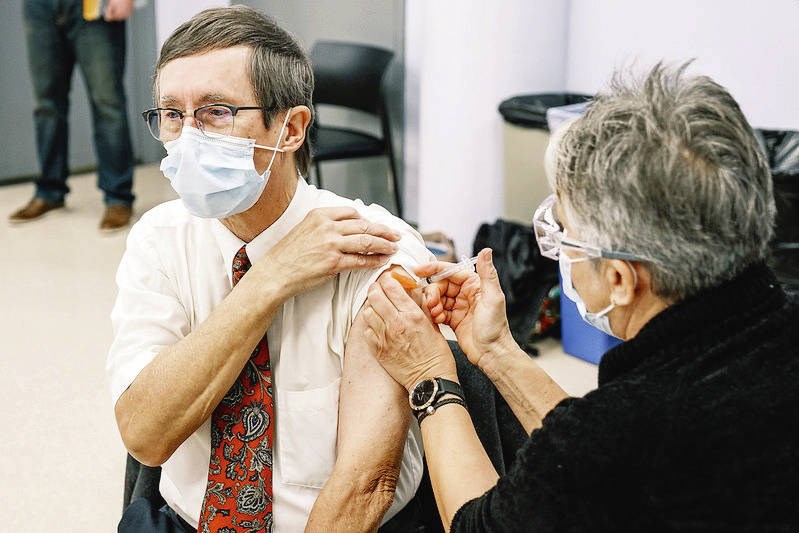Only 427 doses of Oxford-AstraZeneca vaccine of 1,000 available had been administered to people on Vancouver Island when the province pushed the pause button Monday pending more study of the COVID-19 vaccine.
Dr. Richard Stanwick, chief medical health officer for Island Health, said the Island received very few doses of the vaccine, which was earmarked for areas with outbreaks and for essential workers — including front-line responders, teachers and grocery clerks.
“We received a total of 1,000 doses because we were not prioritized — most of the AstraZeneca went to either the Lower Mainland, Interior or North — and of the doses we administered, 427, that was largely to deal with food processing employees,” Stanwick said. The remainder went to the Lower Mainland.
Canadian provinces, including B.C., suspended use of the Oxford-AstraZeneca COVID-19 vaccine in people under age 55 on Monday as Health Canada demanded the company do a detailed study on the risks and benefits of its vaccine across multiple age groups.
The precautionary measures comes after concerns from Canada’s National Advisory Committee on Immunization about a possible link between the shot and a rare type of blood clot.
The condition is called vaccine-induced prothrombotic immune thrombocytopenia, said B.C. provincial health officer Dr. Bonnie Henry. Symptoms usually occur in four to 20 days and early diagnosis and treatment can help prevent serious outcomes.
The pause on the vaccine’s use is expected to last “for the next few days,” Henry said. “There’s been less than 30 cases identified around the world, primarily in Europe.”
On Tuesday, the province announced the AstraZeneca vaccine would be offered to Lower Mainland residents between the ages of 55 and 65 through a partnership between Immunize B.C. and community pharmacists.
In a statement, Henry said officials know from the millions of doses used worldwide that the vaccine is highly effective and the benefits to those over age 55 far outweigh the risks of getting COVID-19.
Stanwick said it can be a challenge to communicate the risk of vaccines versus the consequences of acquiring a virus like COVID-19.
“We haven’t emphasized [that] as many as one in five people who develop COVID experience some form of clotting problem,” he said. “So one in five, 20 per cent, versus, literally, maybe one in 100,000, one in 200,000, with a vaccine.”
The World Health Organization has said the odds are more like one in a million.
Henry said Monday that it’s unlike that there will be any cases of clots in B.C. or Canada. “But it is also a condition that we have a test for, and there’s treatment.”
If you receive the AstraZeneca vaccine and develop symptoms such as headache or swelling, you can seek medical attention, Henry said.
If you received the vaccine more than 20 days ago, there is no need to worry, she said.
— With a file from The Canadian Press



